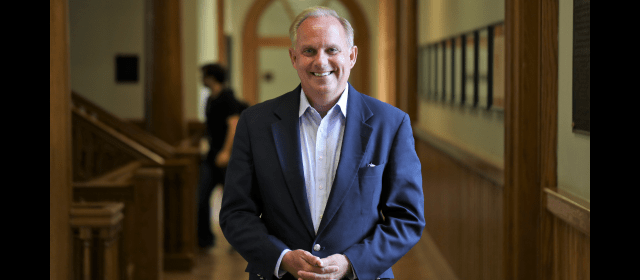BNG columnist and Baylor University professor Greg Garrett has received a three-year, $488,000 grant from the Eula Mae and John Baugh Foundation to further his research on how film and other media shape attitudes about race and racism.
“I’m so grateful to be entrusted with these resources,” Garrett said. “They’ll be employed to help people who look like me to recognize the stories we’ve told and the structures we’ve set up to preserve our privilege and to diminish people of other races.”
Garrett’s monthly columns for BNG often reflect this work, as does his latest book, A Long, Long Way: Hollywood’s Unfinished Journey from Racism to Reconciliation.
“He has carved out a specialty in both film and race and the intersection of the two.”
As a professor of English at Baylor, he has carved out a specialty in both film and race and the intersection of the two. He is a co-founder of the annual film festival sponsored by Baylor at the Washington National Cathedral, the “Long, Long Way Series,” analyzing the ways film and culture can impact conversations on race and justice. He also serves as theologian in residence at the American Cathedral in Paris, where he has lectured and organized events that connect race and film.
Film and other media have the ability to create both positive and negative messages about race and culture and mythology, Garrett said.
“Racial mythologies have been deeply embedded in American life, from film to legal codes to theology to popular and material culture,” he explained. “Any myth that denies a person her or his humanity has to be excavated, examined and repented. So often, we are unconscious of the degree to which those mythologies are operating and even defining us.”
“Mythology” is a frequent way of talking about these influences, the professor said, “The value people often attach to it is that mythology is a lie. But I’m much more involved with the idea that mythology shapes the way we understand our lives, the world, God and each other. Racial mythologies about the inferiority of other races are untrue in the way we usually think of myths as lies, but they’re also powerfully true in the way that people have oriented their lives around them and used them to make sense of the world.”
“Any myth that denies a person her or his humanity has to be excavated, examined and repented.”
In his teaching and lecturing and preaching, Garrett regularly draws upon films such as “Gone with the Wind” and “Do the Right Thing,” or “Birth of a Nation” and “Guess Who’s Coming to Dinner” to illustrate different cultural messages.
Garrett, who is seminary trained and serves as a non-ordained preacher in the Episcopal Church, will use the research grant to look also at sermons and other public speech for the same power to create mythologies as film.
Historically, “while many sermons absolutely recognized the equality of all people, others served the ideas of racial hierarchies and slavery,” he explained. “I am really interested in continuing to excavate these mythologies and helping us develop a higher consciousness about the ways these have been employed and foster meaningful conversations across the racial divide.”
The first phase of his Baugh Foundation-sponsored research will focus on the analysis of movies, books, sermons, theological writing, political discourse and pop culture. A second phase will focus on the development of programming and partnerships that will shape conversations and introspection about the stories society tells.
“Learning that you have allowed false myths to define your reality and resolving to seek truer ones can be a huge part of a movement towards change,” he said. “That’s why conversations, books and public conversations about racial mythology matter. They expose us to stories that have shaped us so that we can no longer live in denial.”
The Baugh Foundation, based in San Antonio, has deep connections to Baylor University and has funded numerous academic programs there, both within the university and within its Truett Theological Seminary. The Baugh Foundation also is a funder of BNG.

